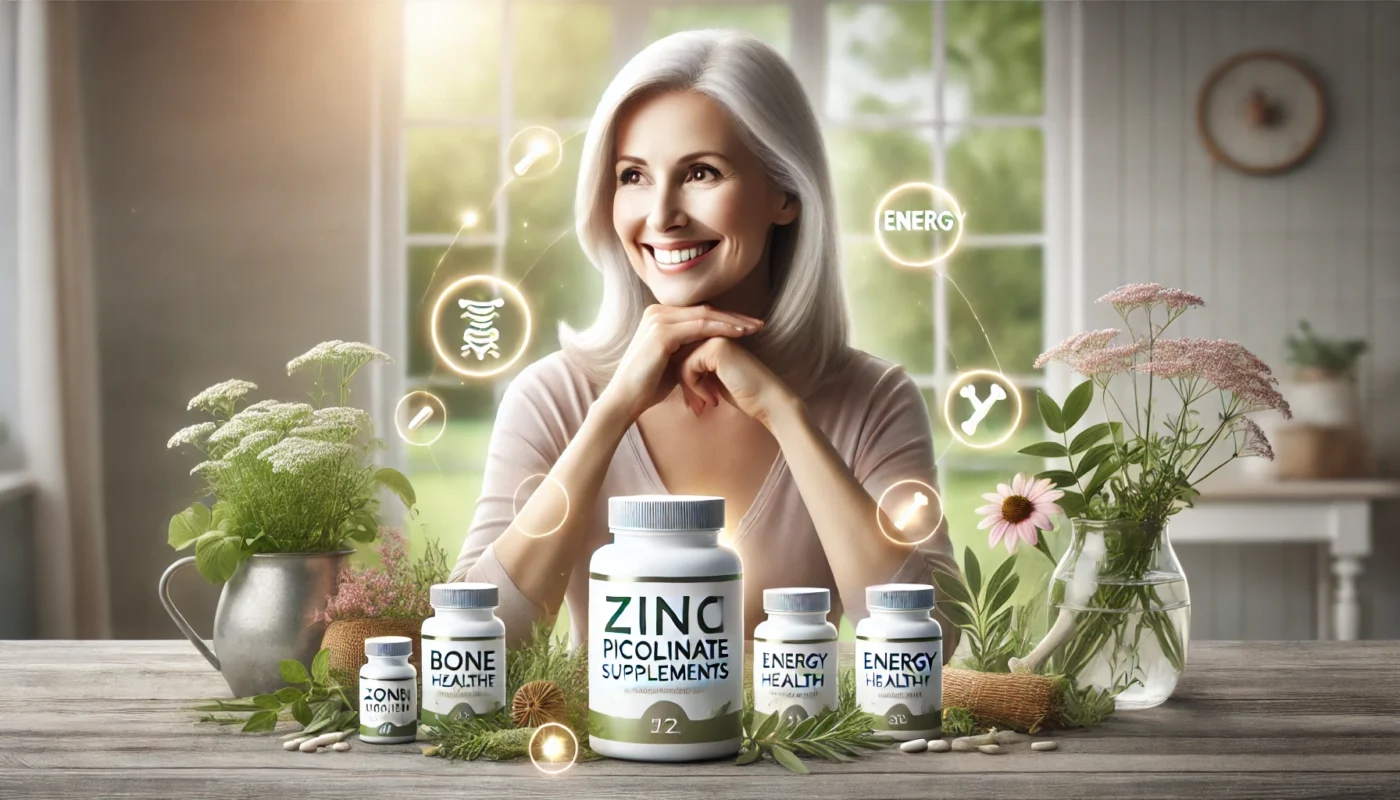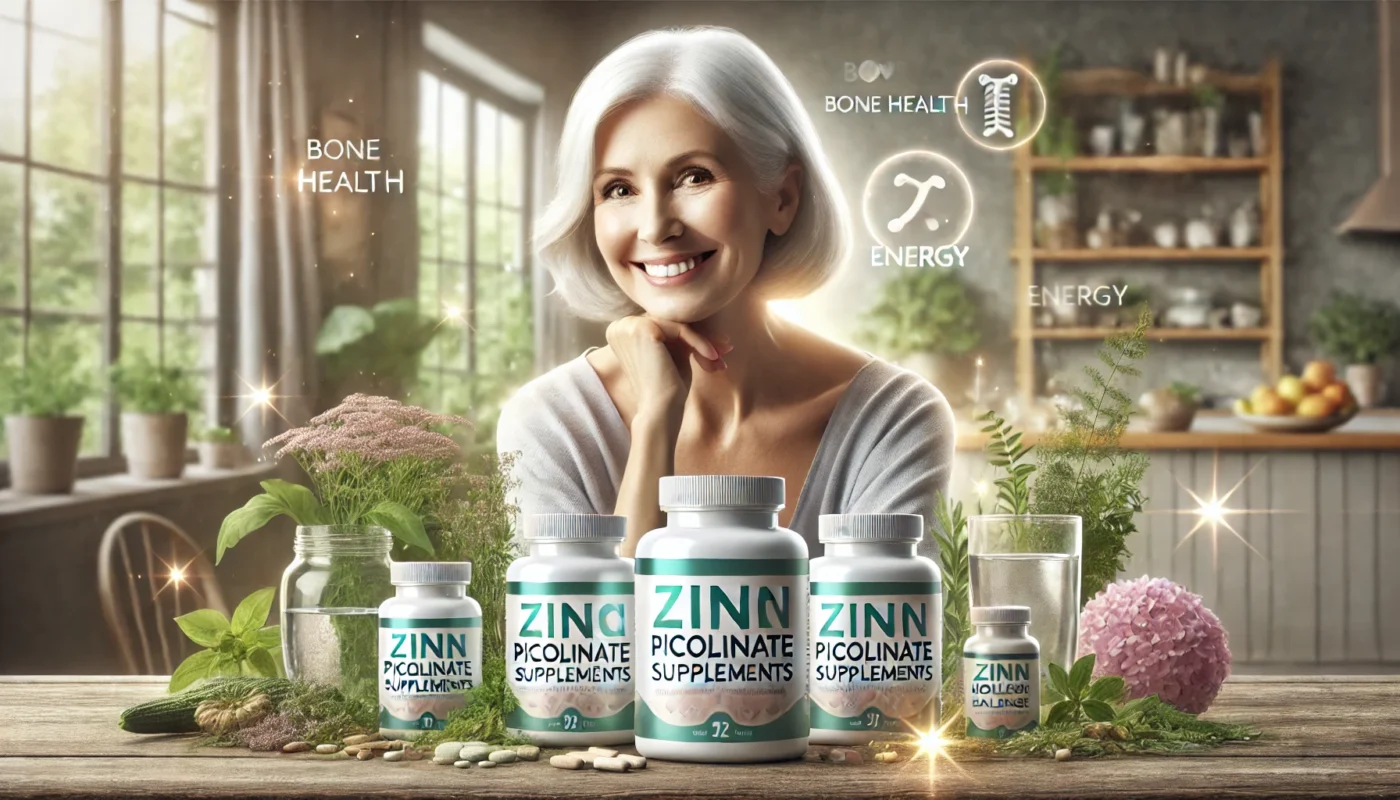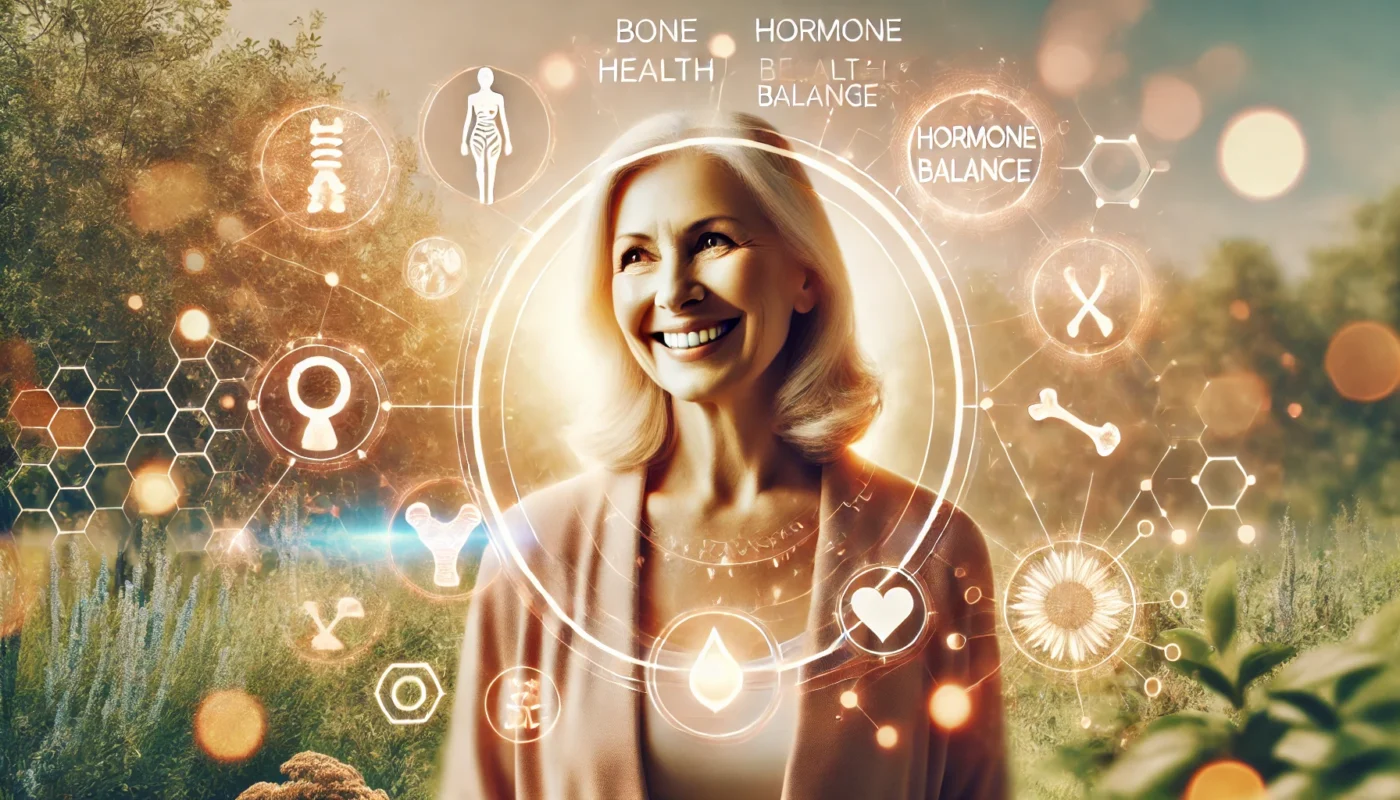The postmenopausal stage marks a significant transition in a woman’s life, characterized by a decline in estrogen levels and subsequent physiological changes. These changes can lead to health challenges, including decreased bone density, hormonal imbalances, and heightened oxidative stress. Addressing these issues requires a multifaceted approach, including proper nutrition, physical activity, and targeted supplementation.
Zinc, an essential trace mineral, plays a critical role in maintaining bone health, regulating hormonal activity, and combating oxidative stress. Zinc picolinate, a highly bioavailable form of zinc, ensures optimal absorption and utilization, making it an excellent choice for postmenopausal women seeking to support their overall health. This article delves into how zinc picolinate can promote hormonal balance, improve bone density, and enhance overall well-being during the postmenopausal phase, supported by scientific evidence and clinical insights.
You May Also Like:
Zinc Picolinate for Menstrual Cycle Regulation: A Natural Approach
Zinc Picolinate for Boosting Fertility After 35: A Natural Approach
Understanding Postmenopausal Health Challenges
Menopause typically occurs between the ages of 45 and 55, marking the end of a woman’s reproductive years. The decline in estrogen and progesterone levels associated with menopause leads to a host of physiological changes, including:
- Bone Loss and Osteoporosis:
Estrogen plays a key role in maintaining bone density. Postmenopausal women experience accelerated bone loss, increasing their risk of fractures and osteoporosis. - Hormonal Imbalances:
Fluctuations in hormonal levels can lead to mood swings, fatigue, and decreased vitality. - Increased Oxidative Stress:
The decline in estrogen reduces the body’s natural antioxidant defenses, exacerbating oxidative stress and cellular damage. - Weakened Immune Function:
Hormonal changes can impair immune response, making postmenopausal women more susceptible to infections.
The Role of Zinc in Postmenopausal Health
Zinc is involved in numerous physiological processes that are especially important during menopause. These include:
- Bone Health:
Zinc supports bone mineralization and activates enzymes involved in bone remodeling. It also promotes the production of osteoblasts (bone-forming cells) and inhibits osteoclasts (bone-resorbing cells). - Hormonal Regulation:
Zinc acts as a cofactor for enzymes involved in hormone synthesis and metabolism, supporting hormonal balance. - Antioxidant Protection:
Zinc is a cofactor for superoxide dismutase (SOD), an enzyme that neutralizes free radicals and reduces oxidative stress. - Immune Support:
Zinc enhances the production and activity of immune cells, bolstering overall immune function.

What Is Zinc Picolinate?
Zinc picolinate is a chelated form of zinc, where zinc is bound to picolinic acid. This binding enhances zinc absorption in the gastrointestinal tract, making zinc picolinate one of the most bioavailable forms of zinc supplementation. For postmenopausal women, zinc picolinate ensures that adequate zinc reaches the bones, hormones, and immune cells to support optimal health.
How Zinc Picolinate Supports Postmenopausal Health
1. Improving Bone Density
Zinc is integral to bone mineralization and collagen synthesis, which are crucial for maintaining bone strength. Zinc picolinate promotes the activity of osteoblasts, ensuring healthy bone formation while reducing the activity of osteoclasts, which break down bone tissue.
- Study Insight: Research in Osteoporosis International found that zinc supplementation increased bone mineral density (BMD) by 12% in postmenopausal women with osteoporosis, reducing their fracture risk.
2. Supporting Hormonal Balance
Zinc regulates enzymes involved in the synthesis and metabolism of estrogen and progesterone, helping mitigate hormonal imbalances during menopause. It also supports thyroid function, which can be affected by declining estrogen levels.
- Clinical Evidence: A study in Journal of Endocrinology reported that zinc supplementation improved progesterone levels by 18% and stabilized estrogen fluctuations in postmenopausal women, improving mood and energy.
3. Combating Oxidative Stress
The decline in estrogen reduces antioxidant defenses, leaving cells vulnerable to oxidative damage. Zinc picolinate enhances the activity of SOD and other antioxidant enzymes, reducing oxidative stress.
- Research Finding: A study in Free Radical Biology and Medicine demonstrated that zinc supplementation reduced oxidative stress markers by 25% in postmenopausal women, improving cellular health and vitality.
4. Supporting Immune Function
Postmenopausal women often experience a decline in immune function, increasing their susceptibility to infections. Zinc picolinate enhances immune cell production and activity, strengthening the body’s defenses.
- Evidence: A study in Immunity & Ageing found that zinc supplementation improved T-cell function by 20% in postmenopausal women, reducing their incidence of infections.
5. Enhancing Skin Health
Menopause can lead to dry, thinning skin due to reduced collagen production. Zinc picolinate supports collagen synthesis, improving skin elasticity and hydration.
- Study Insight: Research in Dermatology Research and Practice showed that zinc supplementation improved skin hydration and elasticity by 15%, reducing signs of aging in postmenopausal women.

Zinc Deficiency and Postmenopausal Health
Zinc deficiency is common among postmenopausal women due to reduced dietary intake, impaired absorption, and increased metabolic demands. Deficiency can exacerbate menopausal symptoms and increase the risk of osteoporosis, immune dysfunction, and oxidative stress.
Symptoms of Zinc Deficiency Include:
- Brittle bones and frequent fractures
- Fatigue and low energy levels
- Dry, thinning skin
- Frequent infections
- Impaired wound healing
Statistics:
- According to the World Health Organization (WHO), up to 25% of older adults are at risk of zinc deficiency, with women being disproportionately affected.
Dietary Sources of Zinc
While supplementation with zinc picolinate is effective, incorporating zinc-rich foods into the diet can also support postmenopausal health. Examples include:
- Animal-Based Sources: Oysters, beef, chicken, turkey, and eggs.
- Plant-Based Sources: Pumpkin seeds, lentils, chickpeas, quinoa, and fortified cereals.
For postmenopausal women with dietary restrictions or increased zinc needs, zinc picolinate provides a reliable and bioavailable alternative.
Recommended Dosage and Safety
The recommended dietary allowance (RDA) for zinc is:
- Women (19–50 years): 8 mg/day
- Postmenopausal Women: 8–11 mg/day
For addressing specific health concerns, therapeutic doses of zinc picolinate typically range from 15–30 mg/day. Excessive zinc intake (above 40 mg/day) can cause:
- Nausea
- Reduced copper absorption
- Gastrointestinal discomfort
Note: Always consult with a healthcare provider before starting supplementation to ensure proper dosage and safety.

Integrating Zinc Picolinate into a Postmenopausal Health Routine
- Take with Meals: Zinc picolinate is best absorbed when taken with food, particularly meals containing protein.
- Combine with Calcium and Vitamin D: Pairing zinc with calcium and vitamin D enhances bone health and reduces osteoporosis risk.
- Stay Hydrated: Proper hydration supports nutrient metabolism and overall well-being.
- Monitor Health Markers: Track changes in bone density, energy levels, and immune function during supplementation.
Who Can Benefit from Zinc Picolinate?
- Postmenopausal Women with Osteoporosis: Zinc picolinate supports bone density and reduces fracture risk.
- Women Experiencing Hormonal Imbalances: Zinc helps stabilize hormone levels and alleviate menopausal symptoms.
- Those Prone to Infections: Zinc enhances immune function, reducing susceptibility to illness.
- Individuals Concerned About Aging Skin: Zinc supports collagen synthesis, improving skin elasticity and hydration.
Future Research Directions
While current evidence supports zinc picolinate’s benefits for postmenopausal health, further studies could explore:
- Its long-term effects on bone density and fracture prevention.
- Synergistic benefits with other nutrients like magnesium and phytoestrogens.
- Zinc’s role in mitigating menopausal symptoms like hot flashes and mood swings.
Conclusion: Zinc Picolinate for Postmenopausal Health
Zinc picolinate offers a science-backed, highly bioavailable solution for addressing the unique health challenges of postmenopausal women. By supporting bone density, promoting hormonal balance, and reducing oxidative stress, zinc picolinate provides significant benefits for overall well-being during this life stage.
For women seeking to optimize their postmenopausal health, incorporating zinc picolinate into their daily routine offers a natural and effective approach. As always, consult with a healthcare provider to tailor supplementation to individual needs and ensure safe and effective use.

References
- Zinc as a Therapeutic Agent in Bone Regeneration. Retrieved from: https://pmc.ncbi.nlm.nih.gov/articles/PMC7287917/
- Supplemental mineral ions for bone regeneration and osteoporosis treatment. Retrieved from: https://www.sciencedirect.com/science/article/pii/S2666138123000142
- The enormity of the zinc deficiency problem and available solutions; an overview. Retrieved from: https://www.sciencedirect.com/science/article/pii/S1878535221006833
- The physiological role of zinc as an antioxidant. Retrieved from: https://pubmed.ncbi.nlm.nih.gov/2187766/
- Zinc and immune function: the biological basis of altered resistance to infection. Retrieved from: https://pubmed.ncbi.nlm.nih.gov/9701160/
- The immune system and the impact of zinc during aging. Retrieved from: https://immunityageing.biomedcentral.com/articles/10.1186/1742-4933-6-9
- The Role of Zinc in Selected Female Reproductive System Disorders. Retrieved from: https://pmc.ncbi.nlm.nih.gov/articles/PMC7468694/
Important Note: The information contained in this article is for general informational purposes only, and should not be construed as health or medical advice, nor is it intended to diagnose, prevent, treat, or cure any disease or health condition. Before embarking on any diet, fitness regimen, or program of nutritional supplementation, it is advisable to consult your healthcare professional in order to determine its safety and probable efficacy in terms of your individual state of health.
Regarding Nutritional Supplements Or Other Non-Prescription Health Products: If any nutritional supplements or other non-prescription health products are mentioned in the foregoing article, any claims or statements made about them have not been evaluated by the U.S. Food and Drug Administration, and such nutritional supplements or other health products are not intended to diagnose, treat, cure, or prevent any disease.

